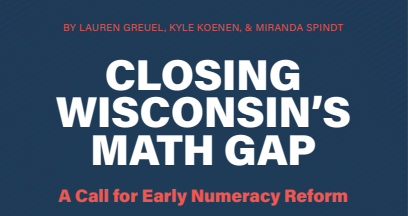MILWAUKEE — A new study from the Wisconsin Institute for Law & Liberty says the state’s math performance is slipping, achievement gaps are widening, and local schools and lawmakers need to act quickly to prevent lasting damage to the economy and future generations.
The report, Closing Wisconsin’s Math Gap: A Call for Early Numeracy Reform, compares Wisconsin’s trends with national and international test results and concludes that early-grade reforms, already adopted in other states,could reverse the slide. WILL also released a model policy that school boards could put in place without waiting for the state Legislature.
National exams show the extent of the problem. On the 2023 Trends in International Mathematics and Science Study, U.S. fourth- and eighth-grade math scores saw their largest drop since the test began. The Program for International Student Assessment placed the United States 27th among developed nations and 55th worldwide. While the 2024 National Assessment of Educational Progress showed small gains, scores are still below where they were before the pandemic, especially among lower-performing students.
Wisconsin’s standing is complicated. The state ranks near the top on some measures, including second in the country for eighth-grade math on the 2024 NAEP and fifth among U.S. states on the 2022 PISA. But the overall trend line is downward. The report notes: “Wisconsin’s PISA math score has dropped more than 12 points since 2018. Average math achievement remains about one-third of a grade level below pre-pandemic levels, and 83 percent of students attend districts where performance is still lower than it was in 2019. The state also has the largest racial achievement gap in math in the nation, largely driven by Milwaukee Public Schools’ chronic underperformance—ranking among the worst districts in the country, trailing only Detroit and Cleveland.”
Kyle Koenen, WILL’s policy director, said math is not just another subject.
“Without strong math skills, Wisconsin’s students will struggle in school, at work, and in life,” said Koenen. “This report highlights practical and bipartisan success stories from seven states that acted, and now it’s time for Wisconsin to do the same. If we want our kids to succeed in school and our workforce to stay competitive, we must start building a stronger math foundation in the early grades.”
The report points to early numeracy laws passed in at least seven states since 2022. Those measures borrow from the literacy playbook, where 41 states have passed “science of reading” laws and states such as Mississippi have seen large gains. In math, Alabama was the first mover. According to the study: “Alabama, the earliest adopter of early numeracy reforms, was the only state in the nation to experience post-pandemic gains in 4th grade math on the 2024 NAEP, demonstrating the potential impact of these reforms.”
WILL’s study describes numeracy as the base for later success: “Strong math skills open the door to higher earnings, greater career mobility, and lower unemployment, while equipping individuals to navigate everyday decisions, from managing finances to interpreting data.”
Lauren Greuel, WILL’s associate counsel, said districts have the ability to begin right away. “School districts don’t have to wait for the Legislature to act. Our model policy gives school boards a clear framework to identify struggling students, support teachers, and close early skill gaps before they grow,” she said.
The call for early math intervention has drawn backing from the business community. Rachel Ver Velde of Wisconsin Manufacturers & Commerce said employers are already feeling the results.
“The ability to do math is a core skill needed in Wisconsin’s workforce,” she said. “Too often employers have workers unable to do basic math. This trend is forcing companies to provide tutoring and additional training to get employees up to speed. The viability of Wisconsin’s future workforce is threatened if we don’t act now.”
Education groups outside Wisconsin have also weighed in.
“Wisconsin has a chance to lead the next wave of education reform by applying the same urgency and evidence-based approach to early math that transformed literacy outcomes across the country. Strong numeracy isn’t optional—it’s essential for student success, workforce readiness, and economic growth,” said Lindsey Henderson, mathematics policy director at ExcelinEd.
The WILL report urges five changes: early screening in kindergarten through second grade; teacher training tied to cognitive science; flexible coaching models for instruction; better communication with parents about results; and public reporting of math performance by school and district. “Wisconsin cannot afford to wait for math achievement to recover on its own,” the study says.
Originally published, September 17, 2025















